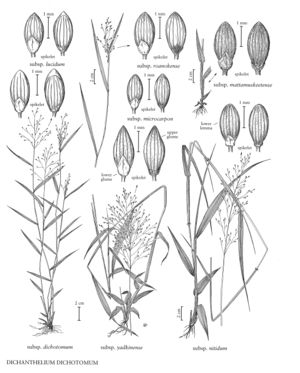Difference between revisions of "Dichanthelium dichotomum subsp. nitidum"
FNA>Volume Importer |
FNA>Volume Importer |
||
| Line 12: | Line 12: | ||
}}<!-- | }}<!-- | ||
| − | --><span class="statement" id="st-undefined" data-properties=""><b>Plants </b>very similar in most respects to | + | --><span class="statement" id="st-undefined" data-properties=""><b>Plants </b>very similar in most respects to subsp. microcarpon. <b>Fall</b> phase freely branching from all nodes, reclining from masses of branchlets and numerous reduced, ciliate blades and secondary panicles. <b>Cauline</b> sheaths and blades usually glabrous, lower sheaths and blades sometimes sparsely pubescent. <b>Spikelets</b> 1.8-2.5 mm (rarely longer), puberulent or pubescent. <b>Lower</b> glumes less than 1/3 as long as the spikelets, subacute; upper glumes and lower lemmas subequal; upper florets 1.7-2 mm long, 0.7-1.0 mm wide, subobtuse. <b>2n</b> = unknown.</span><!-- |
-->{{Treatment/Body | -->{{Treatment/Body | ||
| − | |discussion=<p | + | |discussion=<p>Dichanthelium dichotomum subsp. nitidum grows in moist to wet areas, and the borders of swamps. It is primarily a coastal plain taxon, ranging from Virginia to southeastern Texas and Florida.</p><!-- |
| − | --><p | + | --><p>Dichanthelium dichotomum subsp. nitidum is very similar to both subsp. microcarpon and subsp. mattamuskeetense, and intergrades with each occasionally.</p> |
|tables= | |tables= | ||
|references= | |references= | ||
| Line 32: | Line 32: | ||
|basionyms= | |basionyms= | ||
|family=Poaceae | |family=Poaceae | ||
| + | |illustrator=Linda A. Vorobik and Hana Pazdírková | ||
|reference=None | |reference=None | ||
|publication title= | |publication title= | ||
|publication year= | |publication year= | ||
|special status= | |special status= | ||
| − | |source xml=https:// | + | |source xml=https://bibilujan@bitbucket.org/aafc-mbb/fna-data-curation.git/src/314eb390f968962f596ae85f506b4b3db8683b1b/coarse_grained_fna_xml/V25/V25_1180.xml |
|subfamily=Poaceae subfam. Panicoideae | |subfamily=Poaceae subfam. Panicoideae | ||
|tribe=Poaceae tribe Paniceae | |tribe=Poaceae tribe Paniceae | ||
Revision as of 17:14, 30 October 2019
Plants very similar in most respects to subsp. microcarpon. Fall phase freely branching from all nodes, reclining from masses of branchlets and numerous reduced, ciliate blades and secondary panicles. Cauline sheaths and blades usually glabrous, lower sheaths and blades sometimes sparsely pubescent. Spikelets 1.8-2.5 mm (rarely longer), puberulent or pubescent. Lower glumes less than 1/3 as long as the spikelets, subacute; upper glumes and lower lemmas subequal; upper florets 1.7-2 mm long, 0.7-1.0 mm wide, subobtuse. 2n = unknown.
Discussion
Dichanthelium dichotomum subsp. nitidum grows in moist to wet areas, and the borders of swamps. It is primarily a coastal plain taxon, ranging from Virginia to southeastern Texas and Florida.
Dichanthelium dichotomum subsp. nitidum is very similar to both subsp. microcarpon and subsp. mattamuskeetense, and intergrades with each occasionally.
Selected References
None.
